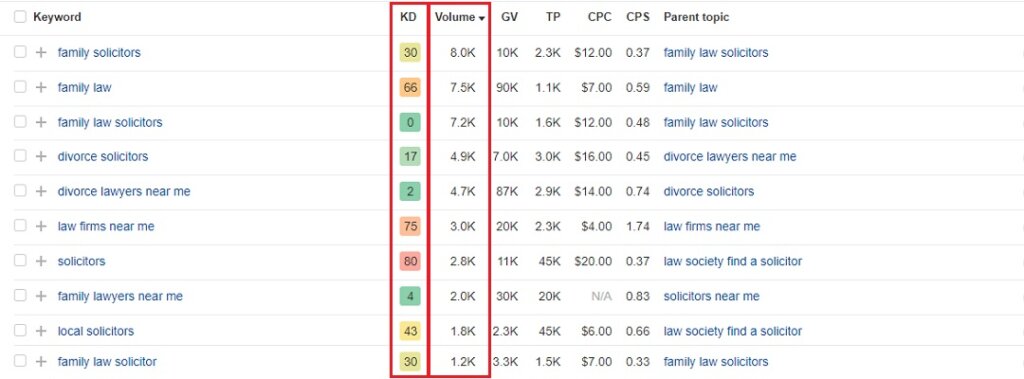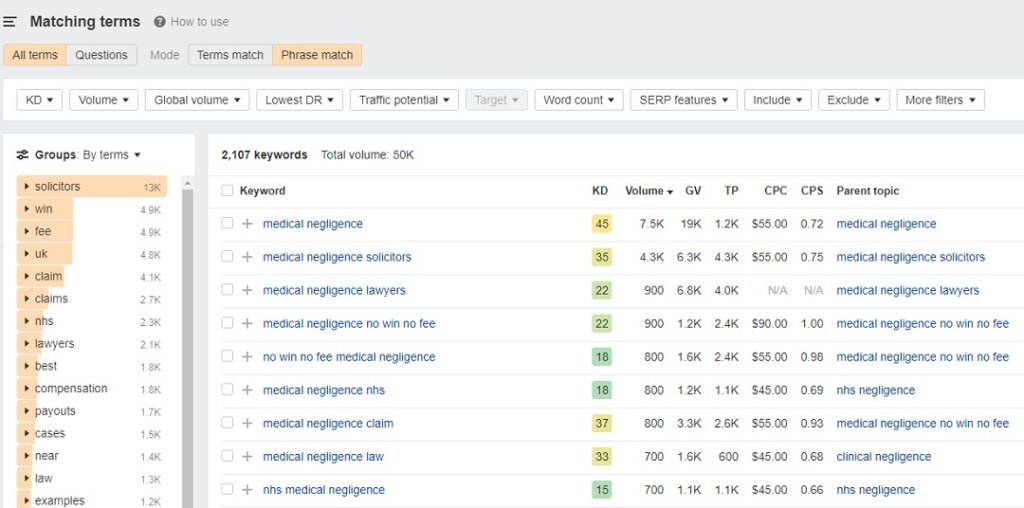How to Identify the Best Google Search Keywords for Lawyers
Did you know that keywords are an essential component of your law firm’s overall SEO strategy? Also known as search terms, keywords help drive organic traffic to your site. And the more traffic you generate, the more likely you are to obtain potential clients. This is one of the primary reasons why most law firms would do everything to find the best keywords for lawyers.
Contents
SEO Keywords 101
Before we delve deeper into finding the best keywords for your SEO campaign, first, we must define precisely what a keyword is. Simply put, keywords are what people enter into search engines when looking for information about a specific product, service, or topic online.
You’d want your website to rank or appear for as many keywords relevant to your legal practice as possible. The more prominently you appear on search result pages, the more likely people will notice and visit you.
Keywords have two main types: Short-tail and long-tail keywords. Short-tail keywords generally comprise three words or fewer. A good example is the term “divorce lawyer”. They are the broadest search terms since most people use them at the beginning of their online query. Despite their high search volume, short-tail keywords have lower conversion rates.
On the other hand, long-tail keywords are four words or longer. Unlike short-tail keywords, they are more specific, giving them higher conversion rates. For example, someone needing a London-based personal injury lawyer might want to know how much it costs to hire one. Therefore, they will likely Google the “cost of hiring a personal injury lawyer in London” or something similar.
Finding the Best Keywords for Your Law Firm’s SEO Strategy
You will need to conduct keyword research to find the best search terms to rank for. As the name implies, keyword research is the process of identifying the words and phrases your prospects are using to find legal services and/or information online.
Keyword research is an integral part of the SEO process. It allows you to determine:
- What your prospects are looking for online.
- What they want to accomplish with their online queries (also known as search or user intent)
- How many people are using specific keywords in their searches.
Taking the time and effort to conduct in-depth keyword research can go a long way towards developing an effective and successful SEO strategy. Here’s how you can identify the keywords you can incorporate into your law firm’s optimisation campaign.
1. Identify the search terms your competitors rank for
An effective way to determine the best keywords for lawyers is to conduct a manual competitor analysis. To put it simply, you need to research your competitors or the top-ranking sites in your target market and determine the practice areas and the type of blogs they are writing to attract visitors. This should give you plenty of ideas about the keywords you should include in your campaign.
Another strategy is to use Google’s Keyword Planner to learn how people in your location search for legal services similar to yours. This nifty tool can also help you identify relevant keywords, allowing you to better understand the search terms and phrases local prospects often use in their online queries.
Besides the keywords themselves, Keyword Planner can provide you with two essential metrics, namely:
- Search volume – how often people look for a particular keyword.
- Competition – how difficult it is to rank for that keyword in your location.
2. Look for relevant search terms
It is also an excellent idea to look for search terms related to your main keywords. For instance, let’s say your area of specialisation is personal injury law and you want to attract potential clients who recently suffered from medical negligence. Therefore, you should consider targeting keywords related to “medical negligence” or “medical negligence lawsuit”.
You can use keyword research tools, such as Google Trends, SEMRush and Ubersuggest, to find keywords relevant to your legal practice. Then, list them down in a spreadsheet and determine their search volume to identify which of them your prospects are likely to use in their searches.
3. Find out what people are asking online
While keyword research tools are a huge help, you need not rely solely on them to determine the best and most relevant keywords for your SEO campaign. You can also get the information you require straight from the horse’s mouth by finding out what legal service customers are asking online.
For instance, you can visit The Telegraph’s Ask a Lawyer section to see the questions people have about various UK legal matters. You can also examine “People also ask” on Google search results after typing in a relevant keyword.
Learning about these questions can offer you many benefits. It can help you:
- Identify the potential queries clients may ask you.
- Understand your prospects’ intent behind every online search.
- Obtain content ideas for your law firm’s website or blog.
- Determine long-tail keywords that can help you generate visits and conversions
Always Conduct Keyword Research
Because successful SEO hinges on incorporating the most relevant keywords into your website and online content, conducting keyword research is crucial. Therefore, you should perform keyword research before you start writing content or developing your service pages. This enables you to determine the search terms and phrases that would help you attract potential clients and generate more conversions.
If you neither have the time nor patience to perform keyword research, we at Kinetic Traffic are happy to take this vital yet often time-consuming task off your hands. Our team of law firm SEO specialists will provide you with the digital marketing solutions you need to establish a bigger online presence and increase your revenues. Please get in touch with us today.
Lead your law firm towards the best results.
Get in touch with our team and let’s talk about your marketing needs.












